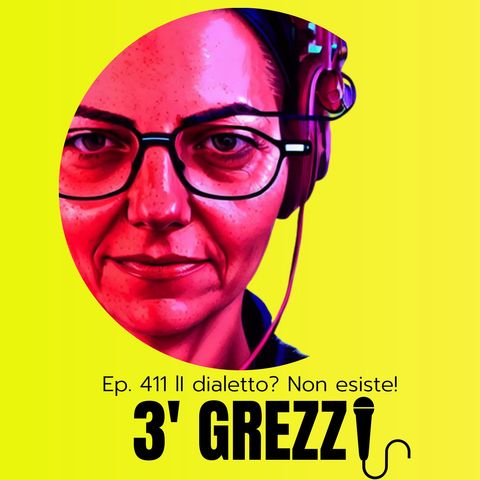3' grezzi Ep. 411 Il dialetto? Non esiste!

Download and listen anywhere
Download your favorite episodes and enjoy them, wherever you are! Sign up or log in now to access offline listening.
Description
LINK https://www.linguisticamente.org/che-differenza-ce-tra-lingua-e-dialetto/ TRASCRIZIONE [ENG translation below] I dialetti non esistono. Non esistono dal punto di vista fonetico e linguistico. La distinzione tra lingua e dialetto è una distinzione puramente politica....
show moreTRASCRIZIONE [ENG translation below]
I dialetti non esistono. Non esistono dal punto di vista fonetico e linguistico. La distinzione tra lingua e dialetto è una distinzione puramente politica. Si chiama lingua quel modo di comunicare che viene protetto da un esercito e viene collegato a una nazione, di cui diventa la lingua ufficiale. Ma dal punto di vista fonetico-linguistico non c'è nessuna differenza.
Quando inizio un nuovo corso di podcast faccio sempre la stessa domanda alle persone che partecipano e chiedo, cosa vi aspettate da questo corso? E inevitabilmente c'è sempre qualcuno che dice "Ah, voglio imparare a parlare senza accento." E io dico, ma guarda che parlare, non esiste nessuna lingua che non abbia un accento, quello che tu dici 'senza accento' è l'accento di un'altra regione. Visto che viviamo in Italia, in Italia hanno deciso a tavolino quale sarebbe stata la lingua ufficiale che avrebbe sostituito il latino, se la sono vista così così il toscano e il siciliano, perché in queste due regioni c'erano due scuole di letteratura molto importanti, poi ai punti ha vinto il toscano, quello che noi parliamo oggi non è altro che il 'dialetto' toscano, che è stato un po' ammorbidito lungo col tempo e poi ogni regione ha creato una sua variante.
Però diciamo che quello è, non esiste l'italiano puro. Parliamo tutti con l'accento. Il problema è però che in Sardegna spesso ci si vergogna del proprio accento, così come ci si vergogna di parlare il sardo, e il sardo, così come tante altre lingue regionali, viene appunto definito 'dialetto' in modo dispregiativo, perché istintivamente noi sappiamo che dialetto vale meno di lingua. Però dal punto di vista linguistico non c'è nessuna differenza. La differenza è tutta politica. Infatti non è un caso che ogni volta che c'è un gruppo che richiede l'indipendenza, questa richiesta di indipendenza è sempre anche legata al poter utilizzare la lingua.
In Sardegna, fino a qualche decennio fa, era proibito usare la lingua sarda negli atti pubblici e solo dopo una legge degli anni '80 che è stato concesso, e questa era una proibizione che risaliva ai Savoia e poi anche al fascismo, il fascismo odiava che si usasse il sardo che appunto veniva definito un dialetto immondo. Quindi ragazzi e ragazze, facciamo attenzione, riappropriamoci della nostra lingua, riappropriamoci della nostra cultura, e il primo passo per fare questo, è anche riappropriarci della nostra lingua e della nostra bella parlata, della nostra bella cadenza. Riempiamo l'etere.
TRANSLATION
Dialects do not exist. They do not exist phonetically and linguistically. The distinction between language and dialect is a purely political one. We call language that way of communicating which is protected by an army and is linked to a nation, of which it becomes the official language. But from a phonetic-linguistic point of view there is no difference.
When I start a new podcast course I always ask the same question to the participants, I ask, what do you expect from this course? And inevitably there's always someone who says, "Ah, I want to learn to speak without an accent." And I say, but look, when you speak, there is no language that doesn't have an accent, what you say 'without accent' is the accent of another region. Since we live in Italy, in Italy they took a deliberate decision about the official language that would replace Latin, Tuscan and Sicilian came very close, because in these two regions there were two very important literary schools, then the Tuscan won on points, what we speak today is nothing more than the Tuscan 'dialect', which has been softened a bit over time and then each region has created its own variant.
But the important thing is that there is no 'pure' Italian. We all speak with an accent. However, the problem is that in Sardinia we are often ashamed of our accent, just as we are ashamed of speaking Sardinian, and Sardinian, as well as many other regional languages, is precisely defined as a 'dialect' in a derogatory way, because we instinctively know that dialect is worth less than language.
From a linguistic point of view there is no difference. The difference is all political. Indeed, it is no coincidence that whenever there is a group that requests independence, this request for independence is also always linked to being able to use the language. In Sardinia, until a few decades ago, it was forbidden to use the Sardinian language in public documents and only after a law of the 80s was granted, and this was a prohibition that dated back to the Savoys and then also to fascism, fascism hated the use of Sardinian, which was defined as an filthy dialect. So boys and girls, let's pay attention, let's reappropriate our language, let's reappropriate our culture, and the first step to do this is also to reappropriate our language and our beautiful speech, our beautiful cadence. Let's fill the ether.
Information
| Author | M. Cristina Marras |
| Organization | M. Cristina Marras |
| Website | - |
| Tags |
Copyright 2024 - Spreaker Inc. an iHeartMedia Company

Comments